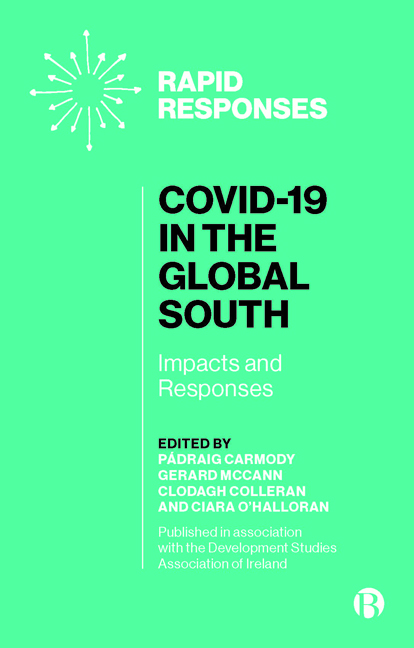1 - COVID-19 Pandemic Ignorance and the ‘Worlds’ of Development
Published online by Cambridge University Press: 23 March 2021
Summary
This contribution reflects critically on what it means to ‘learn’ from the Global South. The starting point is why the ‘Global North’ appears to have learnt so little about pandemic response from the ‘Global South’, despite relevant knowledge being in plain sight. The ongoing global COVID-19 pandemic is an opportunity to learn because it disrupts the labels dividing different ‘worlds’ of development and places a magnifying glass on critical issues of local and global equity and justice. As COVID-19 is a novel disease, it is unsurprising that not enough is known about it. Yet a surprising ignorance has emerged in its wake about how governments should respond, and who is most vulnerable and likely to suffer or die. This ignorance about differential impacts and vulnerabilities cannot exactly be said to be an absence of knowledge. Rather, it is a problem of un-knowing that maps interestingly onto central debates in critical development studies about the proper focal objects, subjects and purposes (the whats, the whos and the whys) of ‘development’.
How and why have issues of local and global inequity and injustice become actively (rather than just accidentally) under-emphasized and ignored? Cognitive frames that present ‘development’ as a question of ‘Northern’ knowledge and competence versus ‘Southern’ lack of knowledge or competence are deeply complicit in the active production of global ignorance, with serious effects.
The worldwide COVID-19 pandemic has surfaced a renewed appreciation of the value of public health systems as national and global public goods. It has laid bare the problems accompanying the promotion of ‘development’ policies and practices complicit in marketization, which erodes and fragments the capacities of public health systems (McCoy, 2020). Countervailing struggles to maintain and reestablish systemic health capacity and equity have become entangled with difficult questions about how to best manage major socioeconomic disruption and economic contraction. A trajectory shift for global ‘development’ has become suddenly thinkable, an opportunity and lesson for development studies itself. It is time for the field of development studies to give up embedded, uncritical frames of separate, ranked ‘worlds’ of ‘development’ in favour of a shared transformative vision.
- Type
- Chapter
- Information
- COVID-19 in the Global SouthImpacts and Responses, pp. 7 - 16Publisher: Bristol University PressPrint publication year: 2020
- 2
- Cited by

